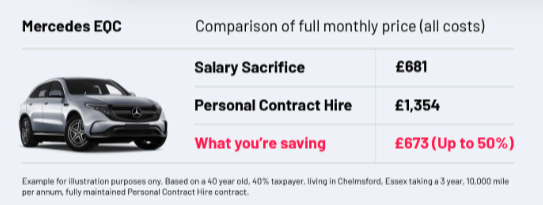IF THE employees of your SME business are feeling the heat of rising costs and surging inflation, then here’s a couple of ways to boost their salary.
First, use an electric car (EV) salary sacrifice scheme to provide them with a fully maintained company vehicle, saving your employee 50% of the costs to run their own car on a personal contract hire agreement (PCH).
And, second, pitch them into an EV rather than a petrol or diesel car. And watch fuel savings of some £2000 a year go straight to the bottom line of their bank accounts.
These suggestions come from fleet management company Fleet Alliance. To illustrate its point, Fleet Alliance has scrutinised the costs of a Mercedes electric estate car on its SME focused salary sacrifice scheme versus the same car on a PCH agreement.
First, Remind Me About Salary Sacrifice
Under a salary sacrifice scheme, you exchange some of your gross salary for a new electric car. With the reduced salary there’s less income tax and National Insurance to pay. There is some benefit in kind tax to pay for the car (currently 2%), but this is negligible in comparison to the other tax savings on offer.
Mercedes-Benz EQC Comparison
The comparison includes everything you would need for your car- so servicing, maintenance – such as new tyres – and insurance under salary sacrifice and compares it with the same car if the employee was to be paying for it personally under a PCH agreement.
The Salary Sacrifice Savings Are Significant

Fleet Alliance CEO, Andy Bruce, says:
It really is a no-brainer. Over a three-year deal, the savings under our salary sacrifice scheme for the electric car add up to a massive £24,000 over a three year agreement – a huge boost for any household with inflation currently at 9% and fuel prices at record levels. There is little wonder we are seeing such a huge interest in our salary sacrifice scheme when British household incomes are under cost pressure like never before.
More Savings By Switching To Electric
Having pocketed a cool £24,000 over three years, your employees could be feeling quite smug. And rightly so. But actually there are further savings to be enjoyed, particularly if they are currently at the wheel of petrol or diesel vehicle.
Using the same Mercedes electric SUV estate, if this is compared with another upmarket German SUV estate, the Audi Q5, over three years some £6000 can be saved in fuel costs.
Fleet Alliance has worked out the costs based on driving 192 miles each week. The costs are calculated on the Mercedes at 2.8m/kWh, the electric equivalent of mpg, with electricity at 14.4p/kWh; for the Audi, Fleet Alliance has based its figures on an average mpg of 32.5 at a cost of 185p per litre for unleaded.
Mercedes v Audi – Electric v Petrol

Andy Bruce again:
The comparison shows how much money you could be saving by switching from the fuel pump to the electric charger. Over three years, that’s a £6,000 fuel cost saving which could help motorists to budget more efficiently and save money, despite the rising cost of living.
Bruce added that there had been positive interest in the company’s SME focused salary sacrifice scheme, with 54 companies now on board, and over 4000 employees benefiting from lower costs and an electric car.
A salary sacrifice scheme takes maximum advantage of prevailing tax regimes and the growing movement to electric cars. And it provides an excellent opportunity to reduce a company’s carbon footprint while providing employees with a brand-new electric vehicle at minimal benefit-in-kind impact. Given the current economic circumstances, there has never been a better time to acquire a brand-new all-electric car through a salary sacrifice scheme like ours.
